Reward Management: Performance, Motivation, and Employee Behavior
VerifiedAdded on 2020/07/23
|10
|2306
|65
Report
AI Summary
This report delves into the crucial role of reward management and performance evaluation within organizations, particularly focusing on its application in the hotel industry. The report examines the significance of employee motivation and behavior in achieving organizational goals and objectives. It analyzes the advantages and disadvantages of individual performance-related pay schemes, using the Cavendish Hall Hotel as a case study. The report explores the impact of both intrinsic (e.g., increased responsibility) and extrinsic (e.g., financial incentives) reward systems on employee performance and customer service. Furthermore, it discusses potential barriers to implementing effective reward systems and provides insights into strategies for enhancing employee engagement and organizational success within the competitive hotel sector. The report concludes by emphasizing the importance of aligning reward practices with overall business objectives to foster a motivated and high-performing workforce.
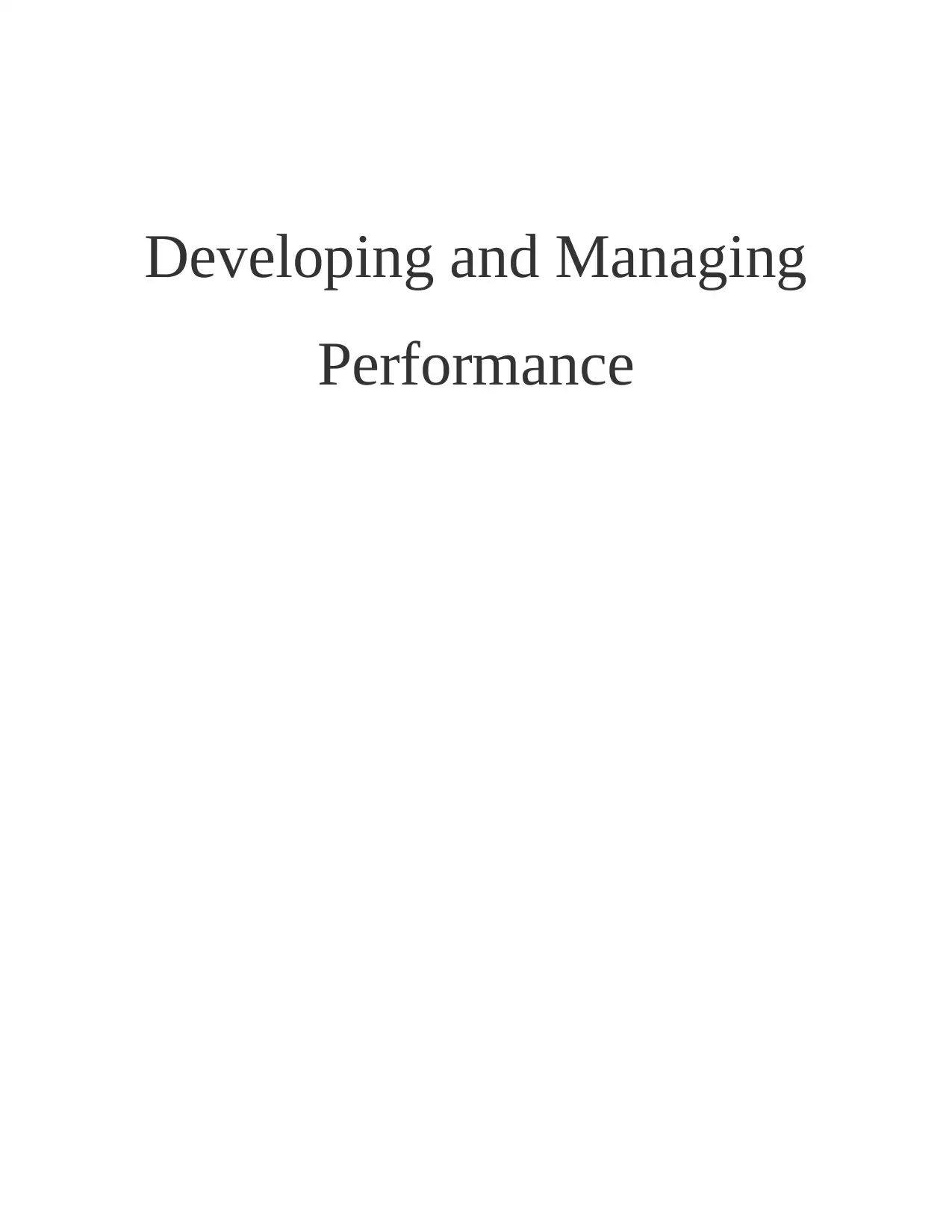
Developing and Managing
Performance
Performance
Paraphrase This Document
Need a fresh take? Get an instant paraphrase of this document with our AI Paraphraser
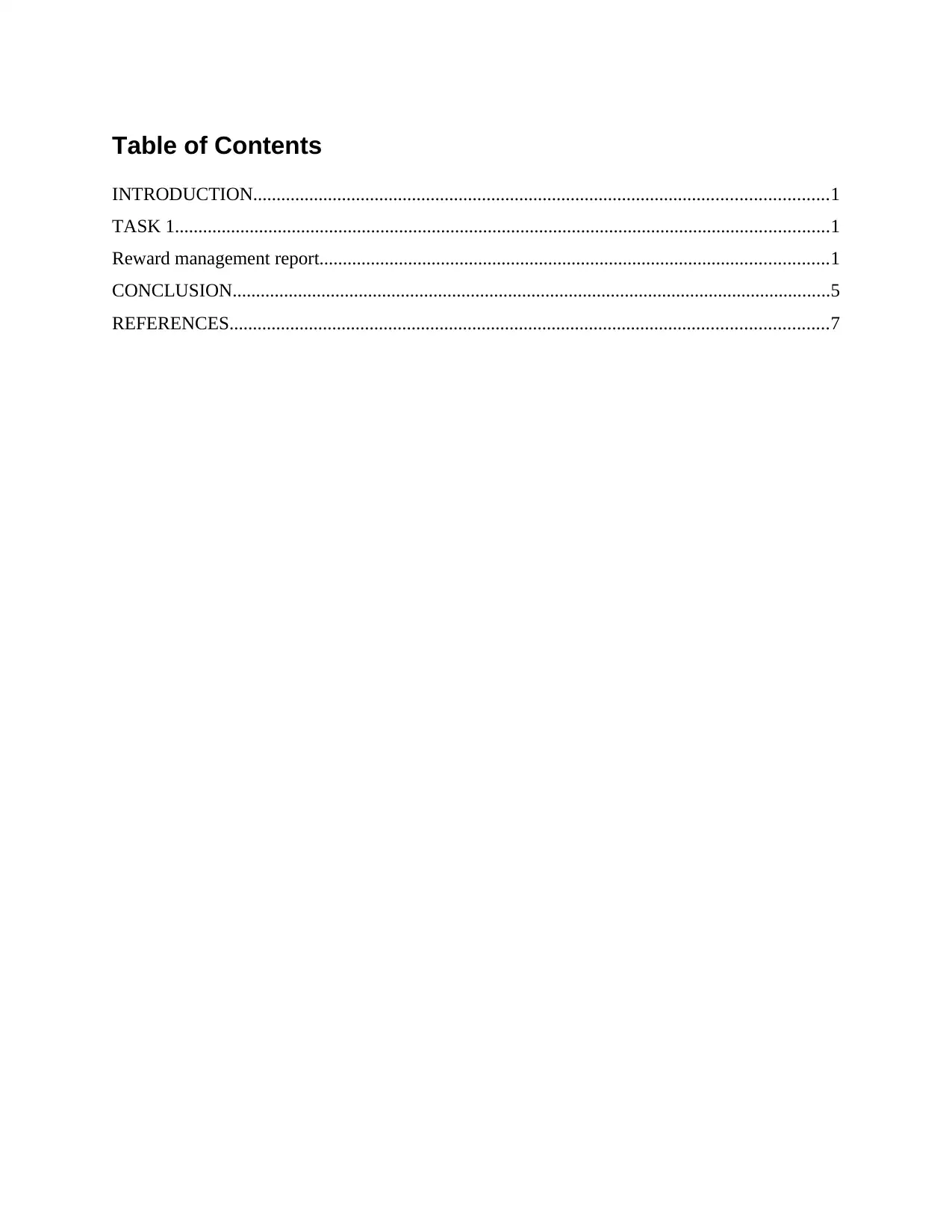
Table of Contents
INTRODUCTION...........................................................................................................................1
TASK 1............................................................................................................................................1
Reward management report.............................................................................................................1
CONCLUSION................................................................................................................................5
REFERENCES................................................................................................................................7
INTRODUCTION...........................................................................................................................1
TASK 1............................................................................................................................................1
Reward management report.............................................................................................................1
CONCLUSION................................................................................................................................5
REFERENCES................................................................................................................................7
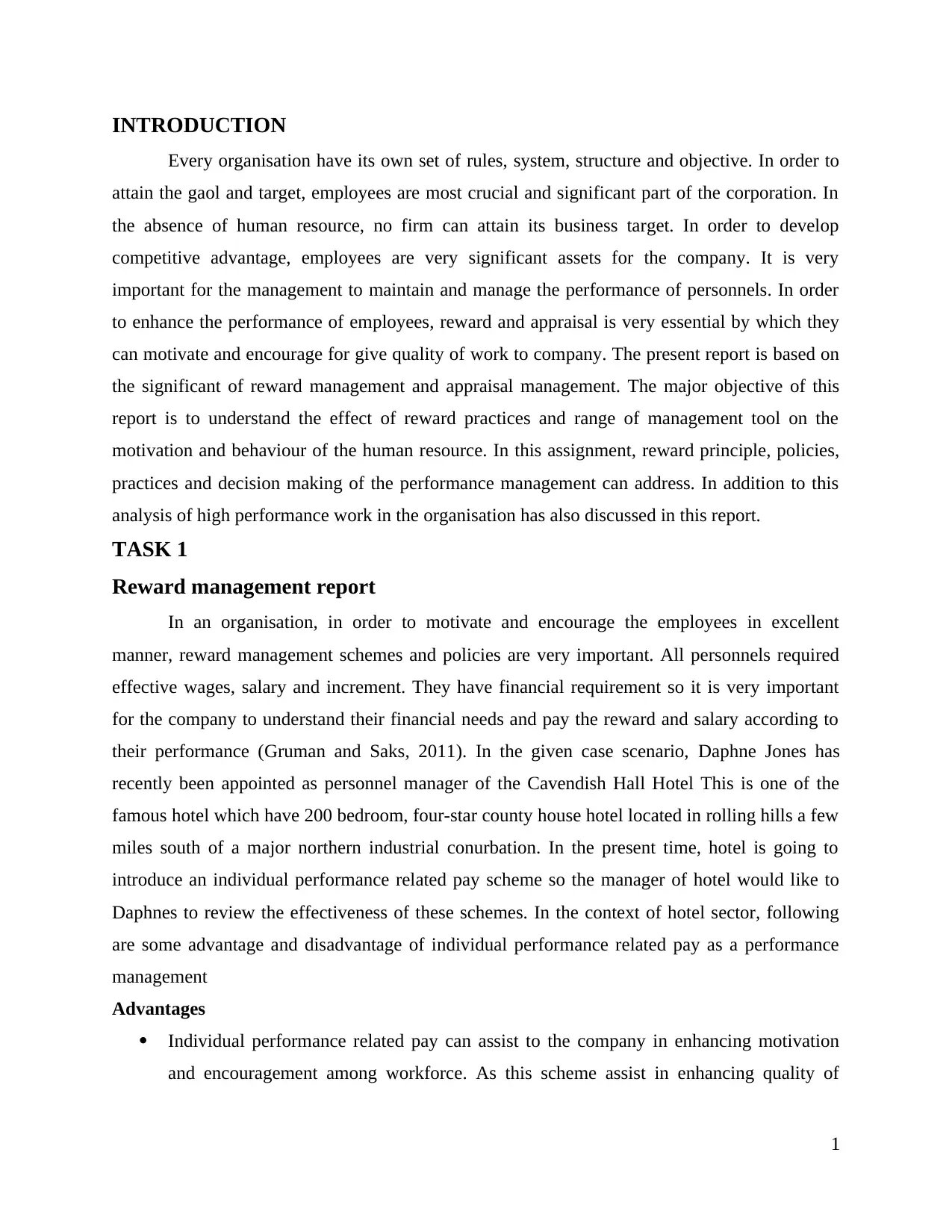
INTRODUCTION
Every organisation have its own set of rules, system, structure and objective. In order to
attain the gaol and target, employees are most crucial and significant part of the corporation. In
the absence of human resource, no firm can attain its business target. In order to develop
competitive advantage, employees are very significant assets for the company. It is very
important for the management to maintain and manage the performance of personnels. In order
to enhance the performance of employees, reward and appraisal is very essential by which they
can motivate and encourage for give quality of work to company. The present report is based on
the significant of reward management and appraisal management. The major objective of this
report is to understand the effect of reward practices and range of management tool on the
motivation and behaviour of the human resource. In this assignment, reward principle, policies,
practices and decision making of the performance management can address. In addition to this
analysis of high performance work in the organisation has also discussed in this report.
TASK 1
Reward management report
In an organisation, in order to motivate and encourage the employees in excellent
manner, reward management schemes and policies are very important. All personnels required
effective wages, salary and increment. They have financial requirement so it is very important
for the company to understand their financial needs and pay the reward and salary according to
their performance (Gruman and Saks, 2011). In the given case scenario, Daphne Jones has
recently been appointed as personnel manager of the Cavendish Hall Hotel This is one of the
famous hotel which have 200 bedroom, four-star county house hotel located in rolling hills a few
miles south of a major northern industrial conurbation. In the present time, hotel is going to
introduce an individual performance related pay scheme so the manager of hotel would like to
Daphnes to review the effectiveness of these schemes. In the context of hotel sector, following
are some advantage and disadvantage of individual performance related pay as a performance
management
Advantages
Individual performance related pay can assist to the company in enhancing motivation
and encouragement among workforce. As this scheme assist in enhancing quality of
1
Every organisation have its own set of rules, system, structure and objective. In order to
attain the gaol and target, employees are most crucial and significant part of the corporation. In
the absence of human resource, no firm can attain its business target. In order to develop
competitive advantage, employees are very significant assets for the company. It is very
important for the management to maintain and manage the performance of personnels. In order
to enhance the performance of employees, reward and appraisal is very essential by which they
can motivate and encourage for give quality of work to company. The present report is based on
the significant of reward management and appraisal management. The major objective of this
report is to understand the effect of reward practices and range of management tool on the
motivation and behaviour of the human resource. In this assignment, reward principle, policies,
practices and decision making of the performance management can address. In addition to this
analysis of high performance work in the organisation has also discussed in this report.
TASK 1
Reward management report
In an organisation, in order to motivate and encourage the employees in excellent
manner, reward management schemes and policies are very important. All personnels required
effective wages, salary and increment. They have financial requirement so it is very important
for the company to understand their financial needs and pay the reward and salary according to
their performance (Gruman and Saks, 2011). In the given case scenario, Daphne Jones has
recently been appointed as personnel manager of the Cavendish Hall Hotel This is one of the
famous hotel which have 200 bedroom, four-star county house hotel located in rolling hills a few
miles south of a major northern industrial conurbation. In the present time, hotel is going to
introduce an individual performance related pay scheme so the manager of hotel would like to
Daphnes to review the effectiveness of these schemes. In the context of hotel sector, following
are some advantage and disadvantage of individual performance related pay as a performance
management
Advantages
Individual performance related pay can assist to the company in enhancing motivation
and encouragement among workforce. As this scheme assist in enhancing quality of
1
⊘ This is a preview!⊘
Do you want full access?
Subscribe today to unlock all pages.

Trusted by 1+ million students worldwide
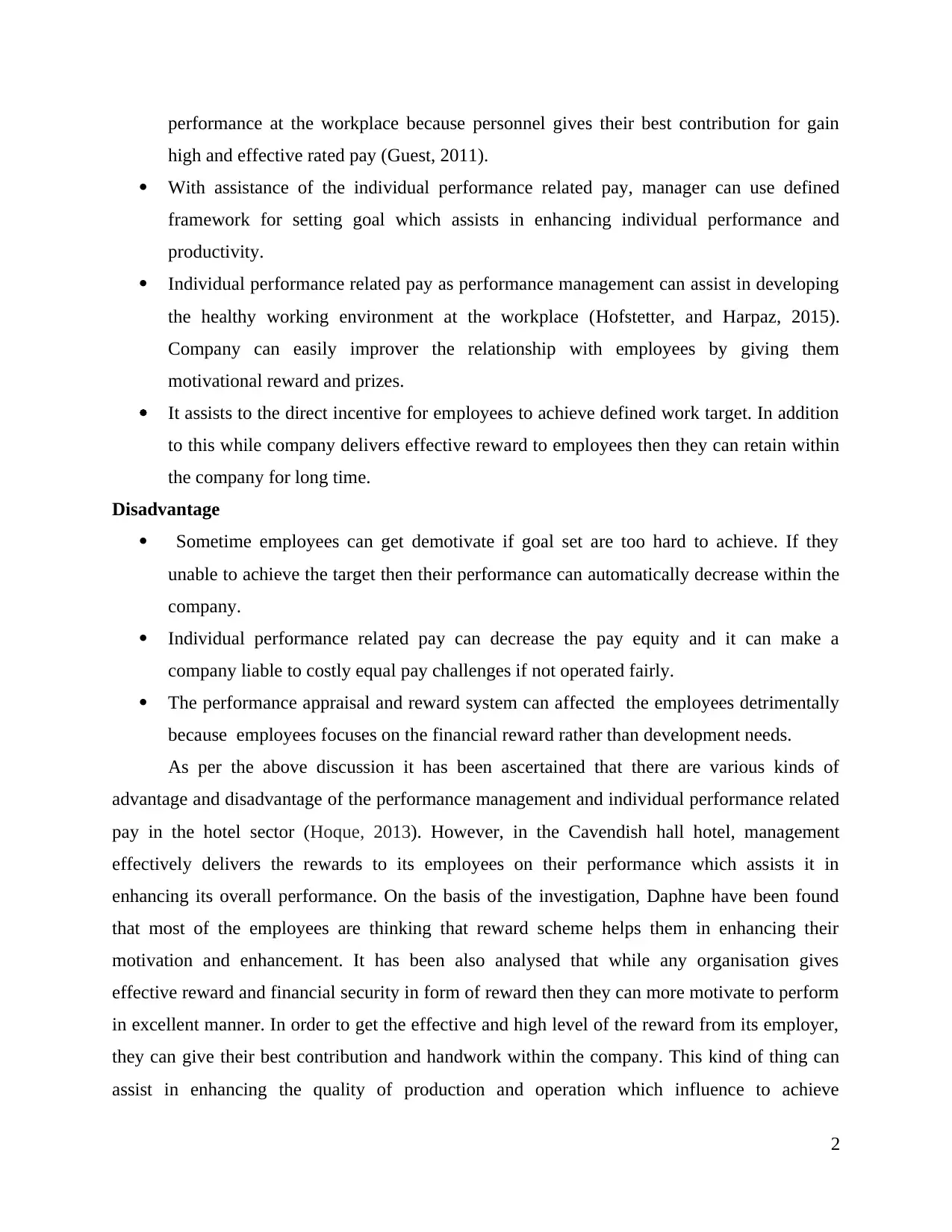
performance at the workplace because personnel gives their best contribution for gain
high and effective rated pay (Guest, 2011).
With assistance of the individual performance related pay, manager can use defined
framework for setting goal which assists in enhancing individual performance and
productivity.
Individual performance related pay as performance management can assist in developing
the healthy working environment at the workplace (Hofstetter, and Harpaz, 2015).
Company can easily improver the relationship with employees by giving them
motivational reward and prizes.
It assists to the direct incentive for employees to achieve defined work target. In addition
to this while company delivers effective reward to employees then they can retain within
the company for long time.
Disadvantage
Sometime employees can get demotivate if goal set are too hard to achieve. If they
unable to achieve the target then their performance can automatically decrease within the
company.
Individual performance related pay can decrease the pay equity and it can make a
company liable to costly equal pay challenges if not operated fairly.
The performance appraisal and reward system can affected the employees detrimentally
because employees focuses on the financial reward rather than development needs.
As per the above discussion it has been ascertained that there are various kinds of
advantage and disadvantage of the performance management and individual performance related
pay in the hotel sector (Hoque, 2013). However, in the Cavendish hall hotel, management
effectively delivers the rewards to its employees on their performance which assists it in
enhancing its overall performance. On the basis of the investigation, Daphne have been found
that most of the employees are thinking that reward scheme helps them in enhancing their
motivation and enhancement. It has been also analysed that while any organisation gives
effective reward and financial security in form of reward then they can more motivate to perform
in excellent manner. In order to get the effective and high level of the reward from its employer,
they can give their best contribution and handwork within the company. This kind of thing can
assist in enhancing the quality of production and operation which influence to achieve
2
high and effective rated pay (Guest, 2011).
With assistance of the individual performance related pay, manager can use defined
framework for setting goal which assists in enhancing individual performance and
productivity.
Individual performance related pay as performance management can assist in developing
the healthy working environment at the workplace (Hofstetter, and Harpaz, 2015).
Company can easily improver the relationship with employees by giving them
motivational reward and prizes.
It assists to the direct incentive for employees to achieve defined work target. In addition
to this while company delivers effective reward to employees then they can retain within
the company for long time.
Disadvantage
Sometime employees can get demotivate if goal set are too hard to achieve. If they
unable to achieve the target then their performance can automatically decrease within the
company.
Individual performance related pay can decrease the pay equity and it can make a
company liable to costly equal pay challenges if not operated fairly.
The performance appraisal and reward system can affected the employees detrimentally
because employees focuses on the financial reward rather than development needs.
As per the above discussion it has been ascertained that there are various kinds of
advantage and disadvantage of the performance management and individual performance related
pay in the hotel sector (Hoque, 2013). However, in the Cavendish hall hotel, management
effectively delivers the rewards to its employees on their performance which assists it in
enhancing its overall performance. On the basis of the investigation, Daphne have been found
that most of the employees are thinking that reward scheme helps them in enhancing their
motivation and enhancement. It has been also analysed that while any organisation gives
effective reward and financial security in form of reward then they can more motivate to perform
in excellent manner. In order to get the effective and high level of the reward from its employer,
they can give their best contribution and handwork within the company. This kind of thing can
assist in enhancing the quality of production and operation which influence to achieve
2
Paraphrase This Document
Need a fresh take? Get an instant paraphrase of this document with our AI Paraphraser
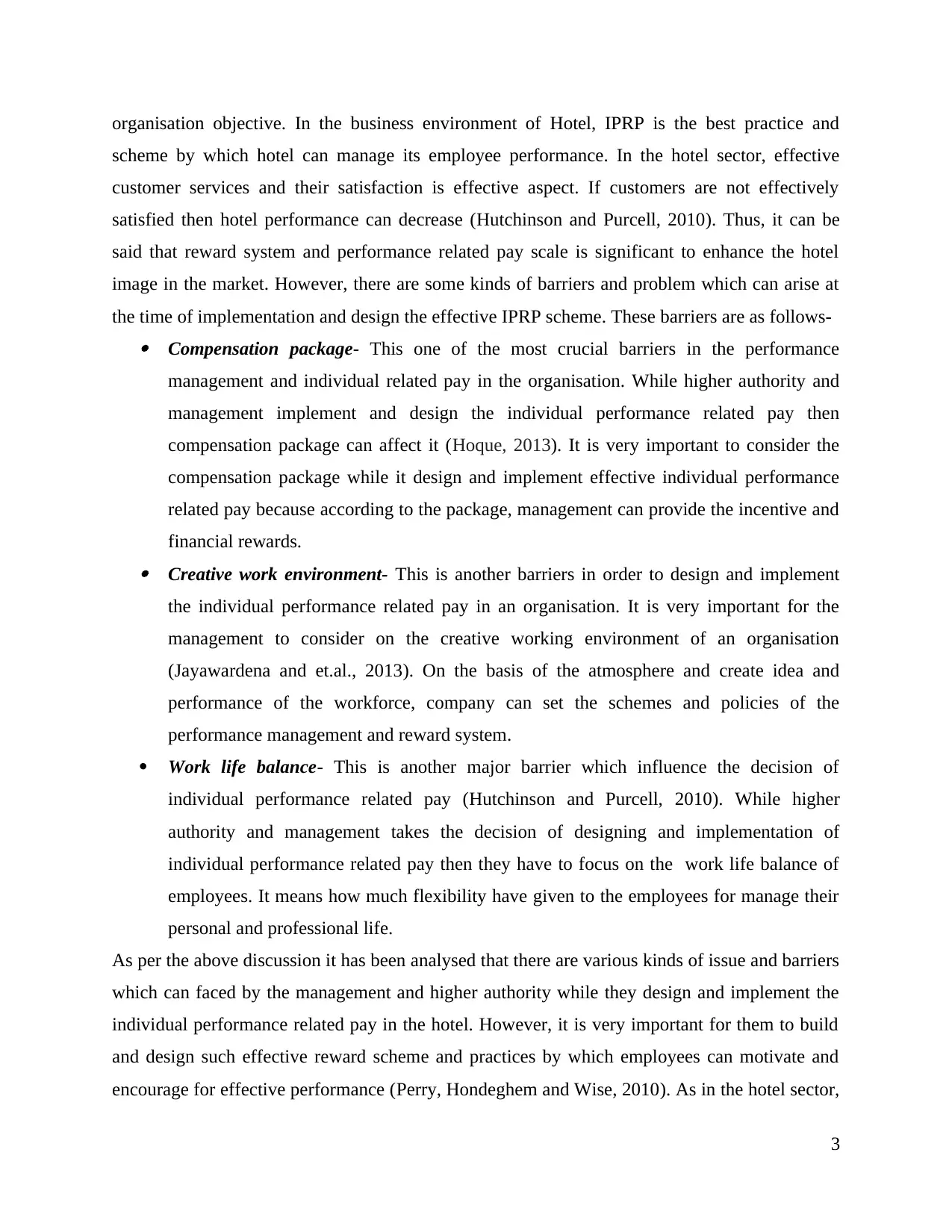
organisation objective. In the business environment of Hotel, IPRP is the best practice and
scheme by which hotel can manage its employee performance. In the hotel sector, effective
customer services and their satisfaction is effective aspect. If customers are not effectively
satisfied then hotel performance can decrease (Hutchinson and Purcell, 2010). Thus, it can be
said that reward system and performance related pay scale is significant to enhance the hotel
image in the market. However, there are some kinds of barriers and problem which can arise at
the time of implementation and design the effective IPRP scheme. These barriers are as follows- Compensation package- This one of the most crucial barriers in the performance
management and individual related pay in the organisation. While higher authority and
management implement and design the individual performance related pay then
compensation package can affect it (Hoque, 2013). It is very important to consider the
compensation package while it design and implement effective individual performance
related pay because according to the package, management can provide the incentive and
financial rewards. Creative work environment- This is another barriers in order to design and implement
the individual performance related pay in an organisation. It is very important for the
management to consider on the creative working environment of an organisation
(Jayawardena and et.al., 2013). On the basis of the atmosphere and create idea and
performance of the workforce, company can set the schemes and policies of the
performance management and reward system.
Work life balance- This is another major barrier which influence the decision of
individual performance related pay (Hutchinson and Purcell, 2010). While higher
authority and management takes the decision of designing and implementation of
individual performance related pay then they have to focus on the work life balance of
employees. It means how much flexibility have given to the employees for manage their
personal and professional life.
As per the above discussion it has been analysed that there are various kinds of issue and barriers
which can faced by the management and higher authority while they design and implement the
individual performance related pay in the hotel. However, it is very important for them to build
and design such effective reward scheme and practices by which employees can motivate and
encourage for effective performance (Perry, Hondeghem and Wise, 2010). As in the hotel sector,
3
scheme by which hotel can manage its employee performance. In the hotel sector, effective
customer services and their satisfaction is effective aspect. If customers are not effectively
satisfied then hotel performance can decrease (Hutchinson and Purcell, 2010). Thus, it can be
said that reward system and performance related pay scale is significant to enhance the hotel
image in the market. However, there are some kinds of barriers and problem which can arise at
the time of implementation and design the effective IPRP scheme. These barriers are as follows- Compensation package- This one of the most crucial barriers in the performance
management and individual related pay in the organisation. While higher authority and
management implement and design the individual performance related pay then
compensation package can affect it (Hoque, 2013). It is very important to consider the
compensation package while it design and implement effective individual performance
related pay because according to the package, management can provide the incentive and
financial rewards. Creative work environment- This is another barriers in order to design and implement
the individual performance related pay in an organisation. It is very important for the
management to consider on the creative working environment of an organisation
(Jayawardena and et.al., 2013). On the basis of the atmosphere and create idea and
performance of the workforce, company can set the schemes and policies of the
performance management and reward system.
Work life balance- This is another major barrier which influence the decision of
individual performance related pay (Hutchinson and Purcell, 2010). While higher
authority and management takes the decision of designing and implementation of
individual performance related pay then they have to focus on the work life balance of
employees. It means how much flexibility have given to the employees for manage their
personal and professional life.
As per the above discussion it has been analysed that there are various kinds of issue and barriers
which can faced by the management and higher authority while they design and implement the
individual performance related pay in the hotel. However, it is very important for them to build
and design such effective reward scheme and practices by which employees can motivate and
encourage for effective performance (Perry, Hondeghem and Wise, 2010). As in the hotel sector,
3
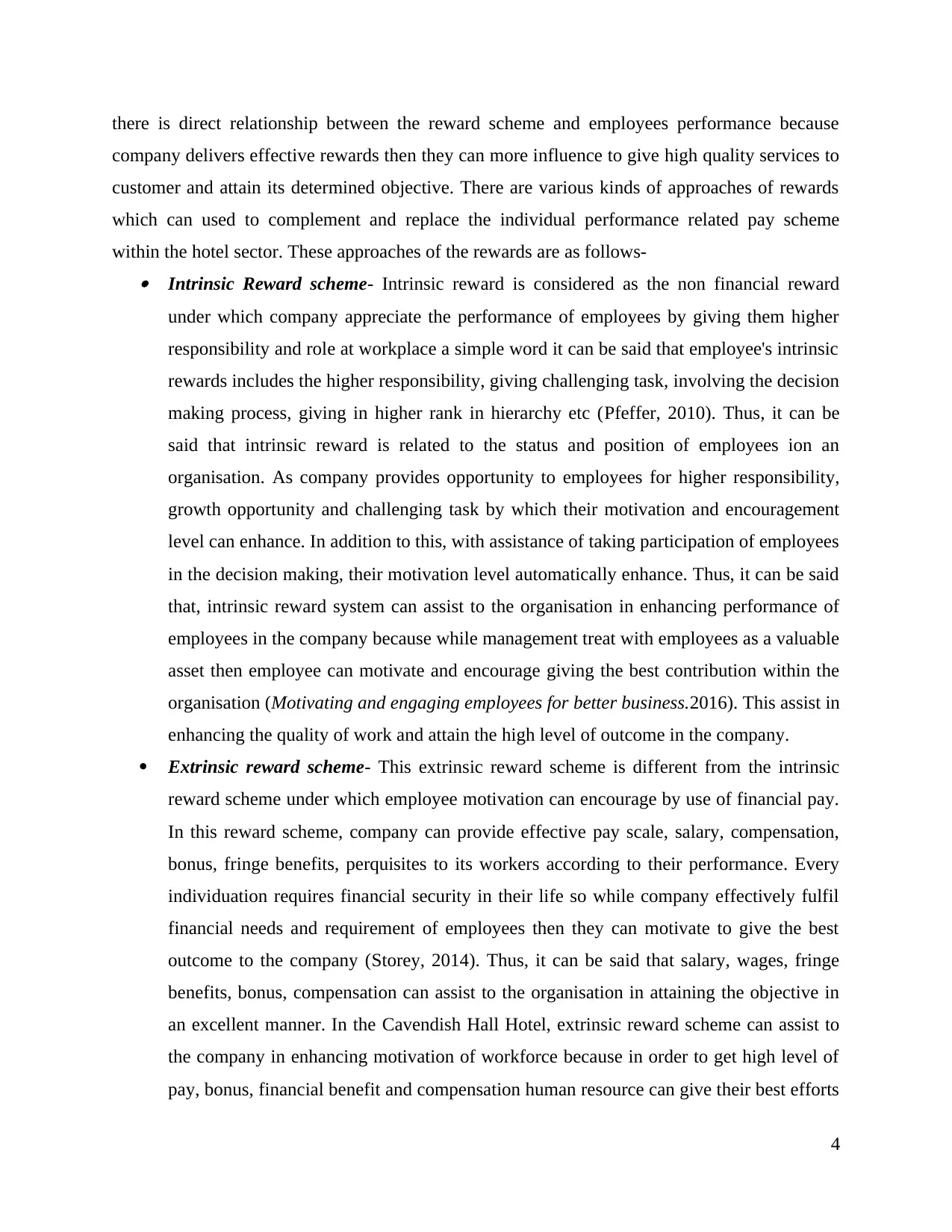
there is direct relationship between the reward scheme and employees performance because
company delivers effective rewards then they can more influence to give high quality services to
customer and attain its determined objective. There are various kinds of approaches of rewards
which can used to complement and replace the individual performance related pay scheme
within the hotel sector. These approaches of the rewards are as follows- Intrinsic Reward scheme- Intrinsic reward is considered as the non financial reward
under which company appreciate the performance of employees by giving them higher
responsibility and role at workplace a simple word it can be said that employee's intrinsic
rewards includes the higher responsibility, giving challenging task, involving the decision
making process, giving in higher rank in hierarchy etc (Pfeffer, 2010). Thus, it can be
said that intrinsic reward is related to the status and position of employees ion an
organisation. As company provides opportunity to employees for higher responsibility,
growth opportunity and challenging task by which their motivation and encouragement
level can enhance. In addition to this, with assistance of taking participation of employees
in the decision making, their motivation level automatically enhance. Thus, it can be said
that, intrinsic reward system can assist to the organisation in enhancing performance of
employees in the company because while management treat with employees as a valuable
asset then employee can motivate and encourage giving the best contribution within the
organisation (Motivating and engaging employees for better business.2016). This assist in
enhancing the quality of work and attain the high level of outcome in the company.
Extrinsic reward scheme- This extrinsic reward scheme is different from the intrinsic
reward scheme under which employee motivation can encourage by use of financial pay.
In this reward scheme, company can provide effective pay scale, salary, compensation,
bonus, fringe benefits, perquisites to its workers according to their performance. Every
individuation requires financial security in their life so while company effectively fulfil
financial needs and requirement of employees then they can motivate to give the best
outcome to the company (Storey, 2014). Thus, it can be said that salary, wages, fringe
benefits, bonus, compensation can assist to the organisation in attaining the objective in
an excellent manner. In the Cavendish Hall Hotel, extrinsic reward scheme can assist to
the company in enhancing motivation of workforce because in order to get high level of
pay, bonus, financial benefit and compensation human resource can give their best efforts
4
company delivers effective rewards then they can more influence to give high quality services to
customer and attain its determined objective. There are various kinds of approaches of rewards
which can used to complement and replace the individual performance related pay scheme
within the hotel sector. These approaches of the rewards are as follows- Intrinsic Reward scheme- Intrinsic reward is considered as the non financial reward
under which company appreciate the performance of employees by giving them higher
responsibility and role at workplace a simple word it can be said that employee's intrinsic
rewards includes the higher responsibility, giving challenging task, involving the decision
making process, giving in higher rank in hierarchy etc (Pfeffer, 2010). Thus, it can be
said that intrinsic reward is related to the status and position of employees ion an
organisation. As company provides opportunity to employees for higher responsibility,
growth opportunity and challenging task by which their motivation and encouragement
level can enhance. In addition to this, with assistance of taking participation of employees
in the decision making, their motivation level automatically enhance. Thus, it can be said
that, intrinsic reward system can assist to the organisation in enhancing performance of
employees in the company because while management treat with employees as a valuable
asset then employee can motivate and encourage giving the best contribution within the
organisation (Motivating and engaging employees for better business.2016). This assist in
enhancing the quality of work and attain the high level of outcome in the company.
Extrinsic reward scheme- This extrinsic reward scheme is different from the intrinsic
reward scheme under which employee motivation can encourage by use of financial pay.
In this reward scheme, company can provide effective pay scale, salary, compensation,
bonus, fringe benefits, perquisites to its workers according to their performance. Every
individuation requires financial security in their life so while company effectively fulfil
financial needs and requirement of employees then they can motivate to give the best
outcome to the company (Storey, 2014). Thus, it can be said that salary, wages, fringe
benefits, bonus, compensation can assist to the organisation in attaining the objective in
an excellent manner. In the Cavendish Hall Hotel, extrinsic reward scheme can assist to
the company in enhancing motivation of workforce because in order to get high level of
pay, bonus, financial benefit and compensation human resource can give their best efforts
4
⊘ This is a preview!⊘
Do you want full access?
Subscribe today to unlock all pages.

Trusted by 1+ million students worldwide
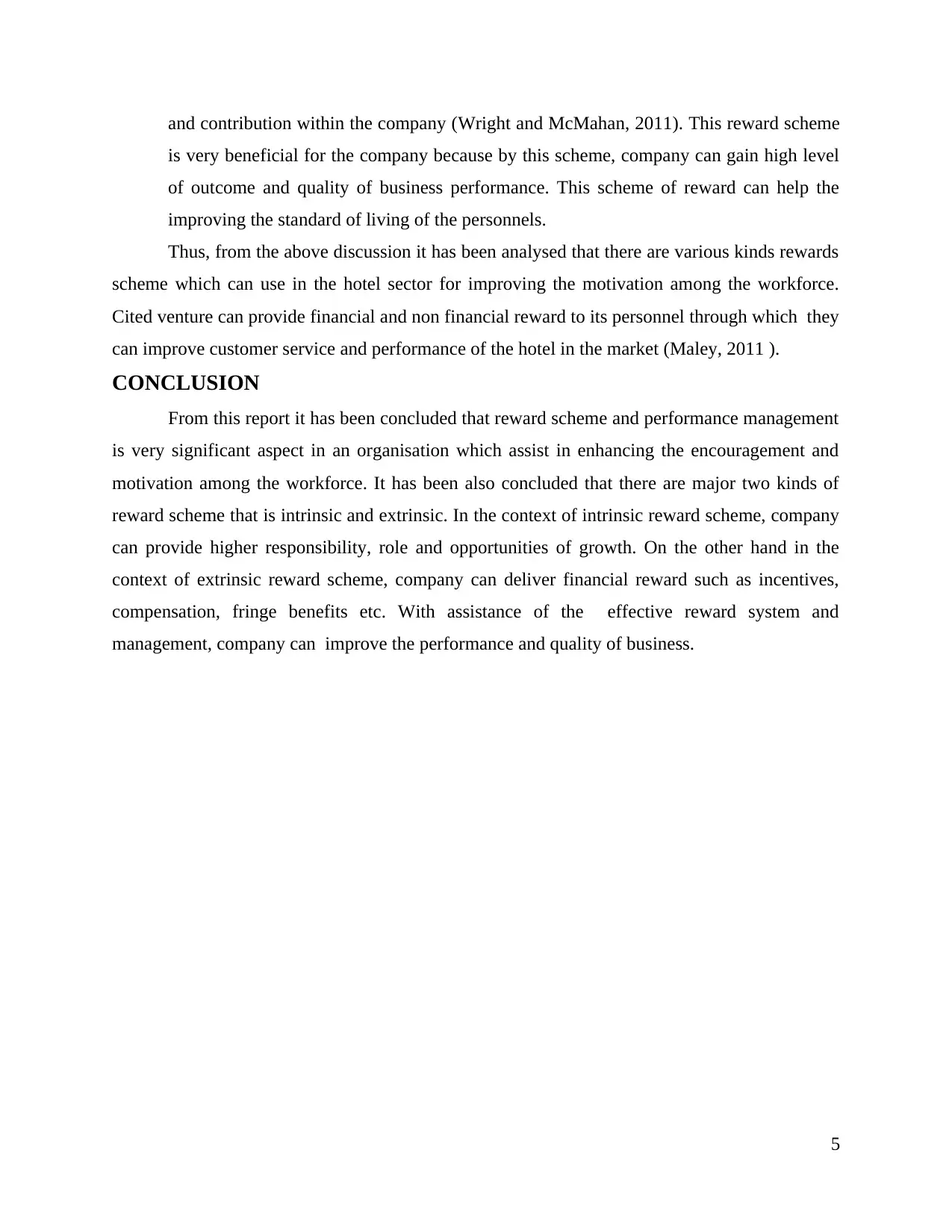
and contribution within the company (Wright and McMahan, 2011). This reward scheme
is very beneficial for the company because by this scheme, company can gain high level
of outcome and quality of business performance. This scheme of reward can help the
improving the standard of living of the personnels.
Thus, from the above discussion it has been analysed that there are various kinds rewards
scheme which can use in the hotel sector for improving the motivation among the workforce.
Cited venture can provide financial and non financial reward to its personnel through which they
can improve customer service and performance of the hotel in the market (Maley, 2011 ).
CONCLUSION
From this report it has been concluded that reward scheme and performance management
is very significant aspect in an organisation which assist in enhancing the encouragement and
motivation among the workforce. It has been also concluded that there are major two kinds of
reward scheme that is intrinsic and extrinsic. In the context of intrinsic reward scheme, company
can provide higher responsibility, role and opportunities of growth. On the other hand in the
context of extrinsic reward scheme, company can deliver financial reward such as incentives,
compensation, fringe benefits etc. With assistance of the effective reward system and
management, company can improve the performance and quality of business.
5
is very beneficial for the company because by this scheme, company can gain high level
of outcome and quality of business performance. This scheme of reward can help the
improving the standard of living of the personnels.
Thus, from the above discussion it has been analysed that there are various kinds rewards
scheme which can use in the hotel sector for improving the motivation among the workforce.
Cited venture can provide financial and non financial reward to its personnel through which they
can improve customer service and performance of the hotel in the market (Maley, 2011 ).
CONCLUSION
From this report it has been concluded that reward scheme and performance management
is very significant aspect in an organisation which assist in enhancing the encouragement and
motivation among the workforce. It has been also concluded that there are major two kinds of
reward scheme that is intrinsic and extrinsic. In the context of intrinsic reward scheme, company
can provide higher responsibility, role and opportunities of growth. On the other hand in the
context of extrinsic reward scheme, company can deliver financial reward such as incentives,
compensation, fringe benefits etc. With assistance of the effective reward system and
management, company can improve the performance and quality of business.
5
Paraphrase This Document
Need a fresh take? Get an instant paraphrase of this document with our AI Paraphraser

6
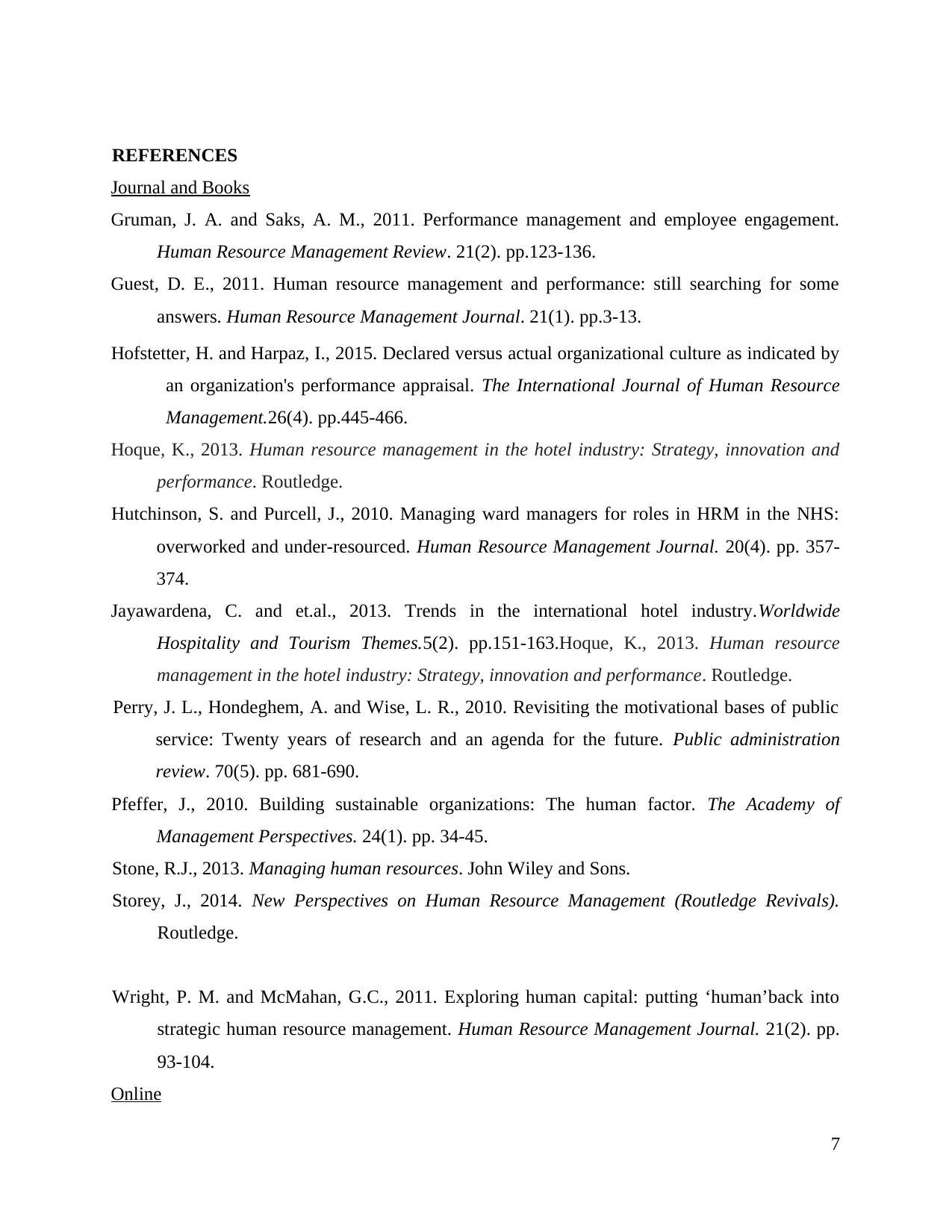
REFERENCES
Journal and Books
Gruman, J. A. and Saks, A. M., 2011. Performance management and employee engagement.
Human Resource Management Review. 21(2). pp.123-136.
Guest, D. E., 2011. Human resource management and performance: still searching for some
answers. Human Resource Management Journal. 21(1). pp.3-13.
Hofstetter, H. and Harpaz, I., 2015. Declared versus actual organizational culture as indicated by
an organization's performance appraisal. The International Journal of Human Resource
Management.26(4). pp.445-466.
Hoque, K., 2013. Human resource management in the hotel industry: Strategy, innovation and
performance. Routledge.
Hutchinson, S. and Purcell, J., 2010. Managing ward managers for roles in HRM in the NHS:
overworked and under‐resourced. Human Resource Management Journal. 20(4). pp. 357-
374.
Jayawardena, C. and et.al., 2013. Trends in the international hotel industry.Worldwide
Hospitality and Tourism Themes.5(2). pp.151-163.Hoque, K., 2013. Human resource
management in the hotel industry: Strategy, innovation and performance. Routledge.
Perry, J. L., Hondeghem, A. and Wise, L. R., 2010. Revisiting the motivational bases of public
service: Twenty years of research and an agenda for the future. Public administration
review. 70(5). pp. 681-690.
Pfeffer, J., 2010. Building sustainable organizations: The human factor. The Academy of
Management Perspectives. 24(1). pp. 34-45.
Stone, R.J., 2013. Managing human resources. John Wiley and Sons.
Storey, J., 2014. New Perspectives on Human Resource Management (Routledge Revivals).
Routledge.
Wright, P. M. and McMahan, G.C., 2011. Exploring human capital: putting ‘human’back into
strategic human resource management. Human Resource Management Journal. 21(2). pp.
93-104.
Online
7
Journal and Books
Gruman, J. A. and Saks, A. M., 2011. Performance management and employee engagement.
Human Resource Management Review. 21(2). pp.123-136.
Guest, D. E., 2011. Human resource management and performance: still searching for some
answers. Human Resource Management Journal. 21(1). pp.3-13.
Hofstetter, H. and Harpaz, I., 2015. Declared versus actual organizational culture as indicated by
an organization's performance appraisal. The International Journal of Human Resource
Management.26(4). pp.445-466.
Hoque, K., 2013. Human resource management in the hotel industry: Strategy, innovation and
performance. Routledge.
Hutchinson, S. and Purcell, J., 2010. Managing ward managers for roles in HRM in the NHS:
overworked and under‐resourced. Human Resource Management Journal. 20(4). pp. 357-
374.
Jayawardena, C. and et.al., 2013. Trends in the international hotel industry.Worldwide
Hospitality and Tourism Themes.5(2). pp.151-163.Hoque, K., 2013. Human resource
management in the hotel industry: Strategy, innovation and performance. Routledge.
Perry, J. L., Hondeghem, A. and Wise, L. R., 2010. Revisiting the motivational bases of public
service: Twenty years of research and an agenda for the future. Public administration
review. 70(5). pp. 681-690.
Pfeffer, J., 2010. Building sustainable organizations: The human factor. The Academy of
Management Perspectives. 24(1). pp. 34-45.
Stone, R.J., 2013. Managing human resources. John Wiley and Sons.
Storey, J., 2014. New Perspectives on Human Resource Management (Routledge Revivals).
Routledge.
Wright, P. M. and McMahan, G.C., 2011. Exploring human capital: putting ‘human’back into
strategic human resource management. Human Resource Management Journal. 21(2). pp.
93-104.
Online
7
⊘ This is a preview!⊘
Do you want full access?
Subscribe today to unlock all pages.

Trusted by 1+ million students worldwide
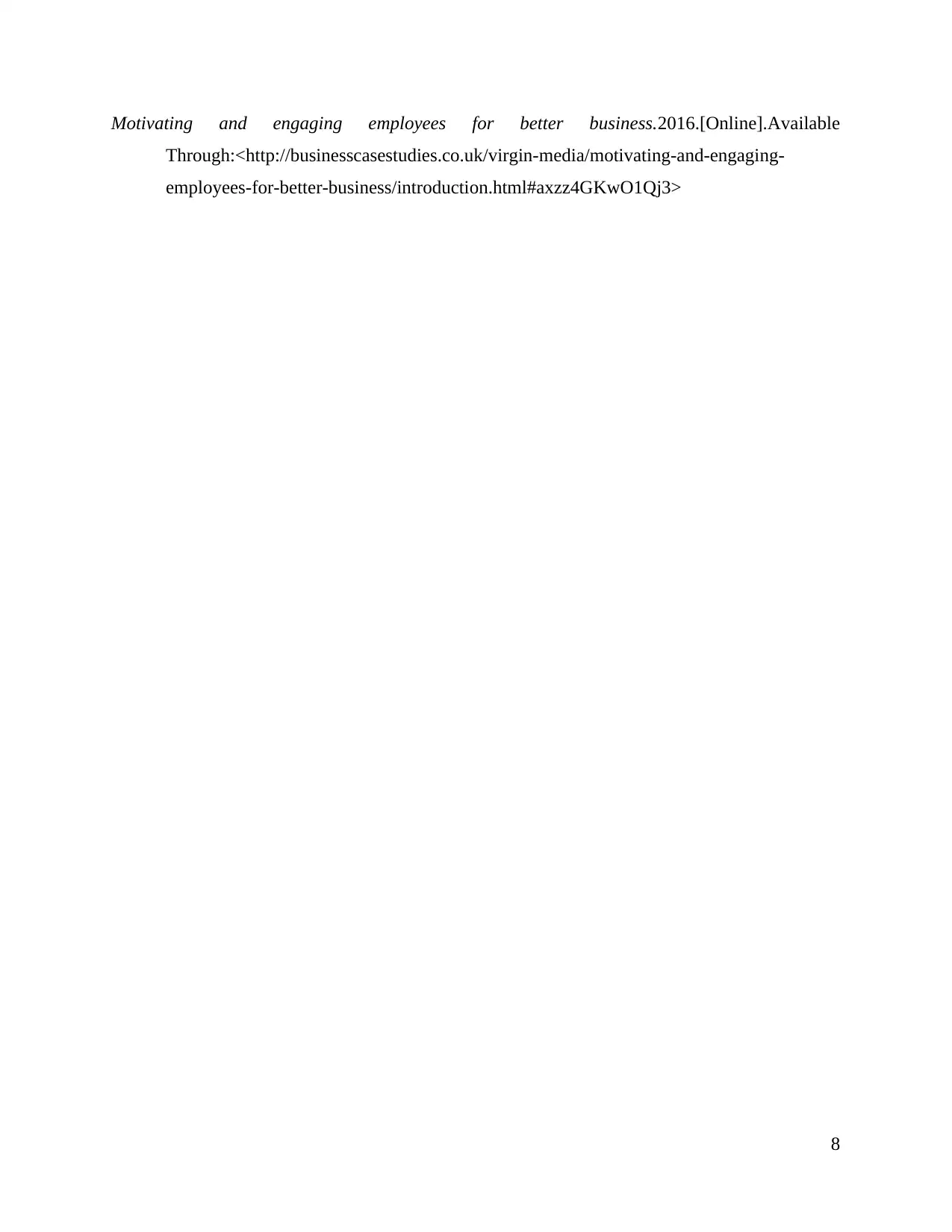
Motivating and engaging employees for better business.2016.[Online].Available
Through:<http://businesscasestudies.co.uk/virgin-media/motivating-and-engaging-
employees-for-better-business/introduction.html#axzz4GKwO1Qj3>
8
Through:<http://businesscasestudies.co.uk/virgin-media/motivating-and-engaging-
employees-for-better-business/introduction.html#axzz4GKwO1Qj3>
8
1 out of 10
Related Documents
Your All-in-One AI-Powered Toolkit for Academic Success.
+13062052269
info@desklib.com
Available 24*7 on WhatsApp / Email
![[object Object]](/_next/static/media/star-bottom.7253800d.svg)
Unlock your academic potential
Copyright © 2020–2026 A2Z Services. All Rights Reserved. Developed and managed by ZUCOL.





